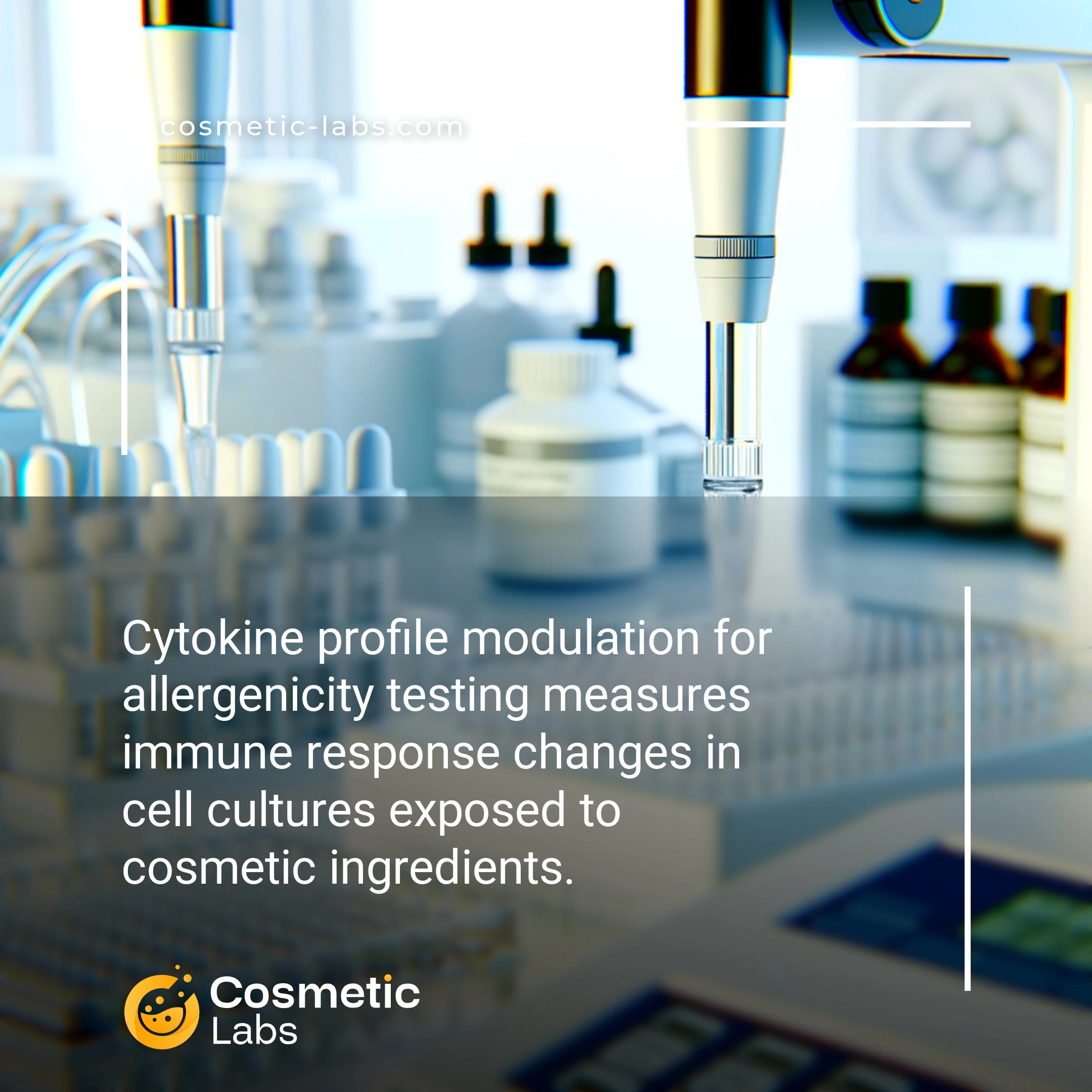Cytokine Testing for Cosmetic Allergenicity Assessment

What is Cytokine profile modulation?
Cytokine profile modulation for allergenicity testing is a lab-based assessment that measures how cosmetic ingredients alter immune cell signaling patterns to predict allergic reactions. This testing analyzes specific inflammatory markers like IL-1β and TNF-α released by skin cells when exposed to your formulation, providing quantitative data on sensitization potential before human trials. Labs use this biomarker approach to identify problematic ingredients early, helping brands avoid costly reformulations and regulatory delays.
Why do you need this service?
Cosmetic labs use cytokine profile modulation testing to screen new ingredients and formulations before market launch, identifying potential allergens that traditional patch testing might miss. This biomarker-based approach helps brands reformulate products early in development, reducing costly recalls and regulatory delays while building consumer trust through safer product portfolios.
Who provides Cytokine profile modulation services?
All cosmetic labs providing Cytokine profile modulation services
There is no company providing these services at the moment.
Cytokine Profile Analysis for Allergenicity Testing
Cytokine profile analysis measures immune system responses to cosmetic ingredients before market launch. This allergenicity testing service evaluates how skin cells react to formulations by tracking inflammatory markers and immune mediators.
Immune Response Measurement Protocols
Labs use advanced cell culture systems to expose keratinocytes and immune cells to test ingredients. The process tracks specific cytokine releases including IL-1β, TNF-α, and IL-8 over 24-48 hour periods.
Testing protocols include:
- Baseline cytokine level establishment
- Dose-response curve generation
- Positive control validation with known allergens
- Statistical analysis of inflammatory markers
Results help brands identify potential allergens before consumer exposure and support regulatory submissions.
Data Interpretation and Risk Assessment
Professional labs translate raw cytokine data into actionable safety profiles. They compare test results against established thresholds and provide clear recommendations for formulation adjustments.
Key deliverables include:
- Quantified inflammatory response levels
- Risk classification reports
- Ingredient safety recommendations
- Regulatory compliance documentation
This testing supports product development decisions and helps brands avoid costly recalls. Connect with specialized labs on our platform to discuss cytokine testing requirements for your specific formulations.
Practical Applications of Cytokine Profile Modulation in Allergenicity Testing
Cosmetic labs use cytokine profile modulation for allergenicity testing to predict skin reactions before products reach consumers, reducing development costs and regulatory delays.
Pre-Market Safety Assessment for New Formulations
Labs analyze cytokine release patterns from keratinocytes and immune cells exposed to cosmetic ingredients. This approach identifies potential sensitizers within 48-72 hours, compared to traditional patch testing that requires weeks. Testing protocols measure interleukin-1α, tumor necrosis factor-α, and chemokine levels to determine allergenicity risk.
Beauty brands submit ingredient lists and receive detailed cytokine response profiles. Labs flag formulations showing elevated inflammatory markers above baseline thresholds, allowing reformulation before costly manufacturing begins.
Regulatory Compliance for International Markets
Different markets require specific allergenicity data for product approval. Labs customize cytokine testing panels based on regional requirements, including EU REACH regulations and FDA cosmetic guidelines. Testing covers common allergens like fragrances, preservatives, and botanical extracts.
Results include dose-response curves and statistical analysis that regulatory bodies accept as alternative testing evidence. Labs provide documentation packages that streamline approval processes across multiple jurisdictions.
| Testing Parameter | Measurement Timeline | Regulatory Acceptance | Cost vs Traditional |
|---|---|---|---|
| IL-1α Release | 24-48 hours | EU, US, Canada | 40% lower |
| TNF-α Expression | 48-72 hours | EU, Japan | 35% lower |
| Chemokine Panel | 72-96 hours | EU, Australia | 50% lower |
Ready to validate your formulation’s safety profile? Contact specialized labs on our platform for cytokine-based allergenicity testing that meets your market requirements.
